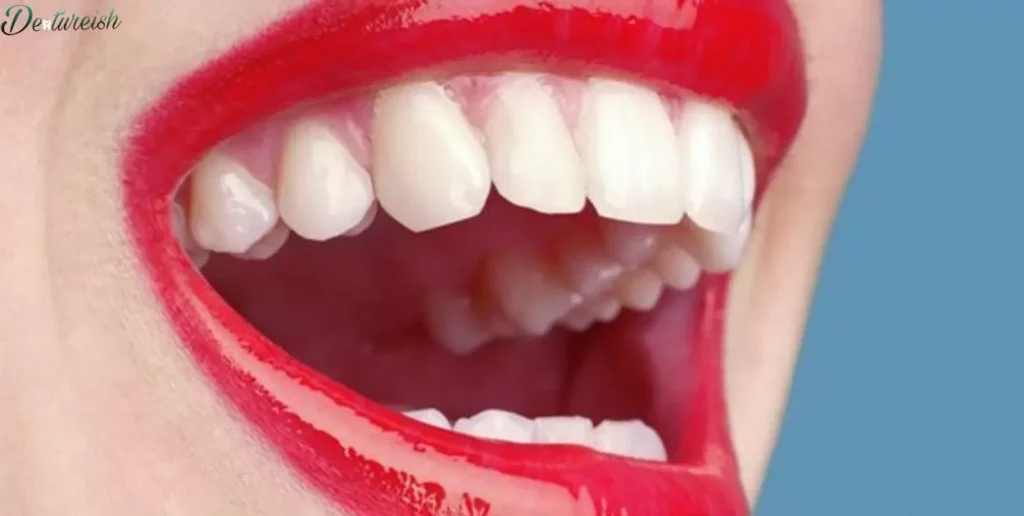A partial denture is a removable dental appliance used to replace missing teeth within the mouth. It consists of artificial teeth attached to a pink or gum-colored base, and it clasps onto the natural teeth for stability. Partial dentures help restore both function and aesthetics for individuals with some missing teeth.
Curious about enjoying your favorite meals without worries? Ever wondered, “Can I eat with a partial denture?” Discover the freedom and confidence of dining with ease while embracing the convenience of a partial denture. Unleash the joy of eating without constraints – your appetite deserves it!
Absolutely! Eating with a partial denture is entirely possible. These removable dental appliances are designed to enhance your ability to chew comfortably and enjoy a variety of foods. With proper care and adjustments, you can savor your favorite meals with confidence.
Can You Eat Chips With Partial Dentures
Enjoying chips with partial dentures is possible! Simply be mindful of biting forces and choose softer varieties to prevent discomfort or damage. Opt for baked or thinner chips, and cut them into smaller pieces to make chewing easier.
Maintaining good denture hygiene is crucial. Clean your partial dentures regularly to avoid any food particles getting stuck. With these tips, you can still savor your favorite snacks without compromising the comfort and functionality of your partial dentures.
Understanding Partial Denture Functionality
Partial dentures are dental prosthetics designed to replace missing teeth. They help restore the natural look and functionality of a person’s smile. These appliances are custom-made to fit comfortably in the mouth, providing support and stability while allowing for proper chewing and speaking.
The key to understanding partial denture functionality lies in their design, which involves using metal or acrylic frameworks to hold the artificial teeth in place. These dentures offer a practical solution for individuals missing some teeth, enhancing their ability to eat, speak, and maintain overall oral health.
Choosing the Right Foods
Selecting the proper foods is crucial when wearing a partial denture. Opt for softer options like cooked vegetables, yogurt, and scrambled eggs to avoid discomfort or damage. Incorporate a variety of nutrient-rich choices to support overall oral health.
Chewing slowly and on both sides of the mouth can prevent uneven pressure on the partial denture. Stay away from sticky or hard foods that may cause the denture to shift. Maintaining a balanced diet and mindful eating habits ensures a comfortable and effective experience with your partial denture.
Guidelines for Eating with Partial Dentures
Eating with partial dentures requires some simple guidelines to ensure comfort and efficiency. Firstly, chew food slowly and on both sides of your mouth to distribute pressure evenly. This prevents discomfort and helps in adjusting to the new dental appliances.
Choose softer foods initially, gradually introducing harder textures as you become accustomed to your partial dentures. Regularly practice speaking and chewing to build confidence and enhance your ability to enjoy a variety of foods comfortably.
Eating With Partial Dentures For The First Time
Trying partial dentures for the first time? Chew slowly and choose softer foods. Start with small bites and practice speaking to get comfortable. Remember, it takes time to adjust.

When eating, focus on foods that require less effort to chew. Opt for well-cooked vegetables and tender meats. Enjoying meals with partial dentures becomes easier with patience and gradual adaptation.
Potential Challenges and Solutions
Addressing potential challenges requires proactive problem-solving. One common obstacle is inadequate communication among team members. To overcome this, fostering open dialogue and encouraging regular updates can enhance collaboration.
“Another challenge organizations often face is the lack of adaptability to change. Partial Denture Out To Eat Providing training and creating a supportive environment can help individuals and teams become more flexible. By actively addressing these challenges, organizations can pave the way for smoother operations and increased success.”
Ensuring Proper Denture Fit
Proper denture fit is crucial for comfort and functionality. Dentists carefully assess the contours of a patient’s gums to create well-fitted dentures. Regular check-ups and adjustments are essential to ensure the dentures continue to fit securely, providing individuals with confidence and the ability to eat and speak comfortably.
Patients play a key role in maintaining proper denture fit. They should promptly notify their dentist of any discomfort or changes in fit. Good oral hygiene practices, such as regular cleaning and removing dentures at night, contribute to optimal fit and overall oral health.
Benefits of Eating with Partial Dentures
- Improved Chewing Ability: Partial dentures restore missing teeth, allowing for better chewing and breaking down food more effectively, enhancing the overall eating experience.
- Enhanced Speech: With partial dentures, speech clarity is improved by filling gaps caused by missing teeth, helping individuals speak more confidently and articulately.
- Prevents Jaw Shifting: Partial dentures maintain the alignment of remaining natural teeth, preventing them from shifting into empty spaces and maintaining a balanced bite.
- Boosts Confidence: Eating with partial dentures restores a natural appearance, boosting self-esteem and confidence by providing a complete and aesthetically pleasing smile.
- Supports Digestion: Properly chewing food with partial dentures aids in the digestion process, ensuring that nutrients are efficiently absorbed, contributing to overall health and well-being.
Common Dietary Restrictions
Many people have common dietary restrictions due to allergies or health concerns. These restrictions often involve avoiding certain foods like gluten, dairy, or nuts. People follow these diets to maintain their well-being and manage specific health conditions.
It’s crucial to be aware of common dietary restrictions when preparing meals for others or dining out. Clear communication and understanding these restrictions can help create inclusive and accommodating environments for everyone, ensuring that individuals with dietary limitations can enjoy meals without compromising their health.
Care and Maintenance of Partial Dentures
Taking care of your partial dentures is crucial for their longevity. Clean them daily with a soft brush and mild soap to remove food particles and plaque. Soaking them overnight in a denture cleaner keeps them fresh and helps maintain their shape.
Regular check-ups with your dentist ensure proper fit and function. Avoid using hot water on your dentures, as it may warp them. Additionally, handle them with care to prevent accidental damage. With consistent cleaning and attention, your partial dentures will stay comfortable and effective for a longer time.
Impact of Diet on Denture Longevity
| Aspect | Impact on Denture Longevity |
| Cleaning Routine | Regular cleaning removes food particles, enhancing longevity. |
| Nutrient-Rich Diet | A balanced diet promotes overall oral health and denture care. |
| Hydration | Proper hydration prevents dryness, maintaining denture integrity. |
| Avoidance of Staining | Minimizing intake of staining agents preserves denture aesthetics. |
| Avoidance of Hard Foods | Steer clear of hard foods to prevent denture damage and fractures. |
| Regular Dental Check-ups | Routine check-ups identify issues early, prolonging denture life. |
Overcoming Discomfort While Eating
Eating with partial dentures can feel uncomfortable initially, but adapting to this change is key. Chew slowly and focus on softer foods, gradually introducing tougher textures. Regularly practice and build confidence, as discomfort often decreases with time and patience.
Maintain good oral hygiene by cleaning your partial dentures and gums daily. Consult your dentist for adjustments if needed. Embracing these habits helps ensure a more comfortable eating experience with partial dentures.
How To Chew With Partial Dentures
Chewing with partial dentures is simple with a few key tips. First, chew slowly and use both sides of your mouth to distribute the pressure evenly. This helps prevent discomfort and ensures efficient chewing.

Cut your food into smaller pieces, making it easier to manage with partial dentures. Practice good oral hygiene by cleaning your dentures regularly to maintain their functionality. Following these steps will make chewing with partial dentures a comfortable and easy experience.
Nutritional Considerations for Denture Wearers
Denture wearers must pay attention to their nutrition for overall health. Eating a balanced diet with a variety of foods helps maintain strong teeth and gums. Include fruits, vegetables, and calcium-rich foods to support oral health and prevent issues like gum disease.
Proper nutrition also aids in the prevention of denture-related problems. Denture wearers should avoid sticky and hard foods that can damage dentures. Regular dental check-ups and maintaining a nutritious diet are essential for the well-being of individuals with dentures, promoting a healthy and comfortable lifestyle.
Adapting to Different Textures
Exploring various textures helps improve adaptability. Touching and feeling different surfaces enhances sensory experiences. Engaging with diverse textures, such as smooth, rough, and bumpy, fosters a better understanding of our surroundings.
Adapting to different textures is a crucial skill in daily life. Developing sensitivity to tactile stimuli aids in navigating the world effectively. By actively engaging with diverse textures, individuals can enhance their ability to adapt and respond to various touch sensations.
Eating With Partial Upper Denture
When using a partial upper denture, chew food slowly and thoroughly. This helps prevent discomfort and allows for better digestion. Choose softer foods and cut them into smaller pieces for easier chewing.
Regular cleaning of the denture is crucial to maintain oral hygiene. Brush the denture daily with a soft-bristled brush and use a denture cleaner as recommended. Remove the denture at night to give your gums a rest and soak it in a denture solution. Taking these steps ensures a comfortable eating experience with a partial upper denture.
Favorite Foods for Partial Denture Users
For those with partial dentures, choosing favorite foods becomes important. Opt for soft and easy-to-chew options like mashed potatoes, yogurt, and soups. Incorporate fruits, cooked vegetables, and tender meats to ensure a comfortable dining experience.
Avoid hard or sticky foods that may strain your dentures. Enjoying a balanced diet with a variety of nutritious and denture-friendly options ensures both satisfaction and ease during meals.
What Can You Not Eat With Partial Dentures
Partial dentures require careful consideration when it comes to food choices. Avoid sticky or hard foods, as they can damage or dislodge the dentures. Opt for softer options like mashed potatoes, yogurt, and cooked vegetables to ensure a comfortable eating experience.
Certain foods, such as nuts and chewy candies, should be avoided with partial dentures. These can be challenging to chew and may cause discomfort or instability. Choose a well-balanced diet with softer textures to maintain the integrity of your partial dentures and enjoy meals without worry.
Dental Professional Guidance
Dental professionals guide individuals in maintaining excellent oral health. They teach effective brushing and flossing methods, stressing the importance of regular dental check-ups. These experts offer personalized advice to address specific dental concerns, ensuring long-lasting smiles.
Their guidance is vital for preventive care and managing dental issues. With clear communication and hands-on support, dental professionals empower individuals to actively participate in their oral health, fostering confidence and a radiant smile.
Social Aspects of Dining with Dentures
Dining with dentures involves various social aspects that individuals should consider. Communicating openly with friends and family about dentures helps create a supportive environment. Choosing denture-friendly foods and maintaining proper denture care ensure confidence and comfort during social meals.
The social aspects of dining with dentures highlight the importance of awareness and open conversation. Embracing these aspects positively contributes to a seamless dining experience, fostering understanding and acceptance within social circles.
My Partial Denture Moves When I Eat
When eating, my partial denture sometimes shifts, causing discomfort. This movement may result from changes in the jawbone or an improper fit. Consulting a dentist is essential to adjust the denture, ensuring a secure and comfortable fit while eating.
Dental professionals can evaluate the fit of the partial denture, making necessary adjustments to prevent movement during meals. Regular check-ups and communication with the dentist help address any issues promptly, ensuring a stable and functional partial denture experience for everyday activities like eating.
Avoiding Damaging Eating Habits
To keep your partial denture in good shape, steer clear of harmful eating habits. Chew carefully, avoiding overly hard or sticky foods that could damage the denture. Opt for softer, denture-friendly options to ensure longevity and comfort.
Take care when biting into tough items and distribute chewing evenly. By adopting mindful eating habits, you safeguard your partial denture, allowing it to serve you well and maintain your oral well-being.
Improving Chewing Efficiency
Partial dentures enhance chewing efficiency by replacing missing teeth. They are custom-made to fit comfortably in the mouth, providing a natural and functional solution. Patients experience improved bite strength, allowing them to enjoy a wider variety of foods and maintain a balanced diet.
With partial dentures, individuals regain the ability to chew confidently, supporting overall oral health. These dental appliances not only enhance the aesthetic appearance of the smile but also contribute to better digestion and nutrition, promoting a healthier and more fulfilling lifestyle.
Can You Eat Pizza With Partial Dentures
Sure, you can enjoy pizza with partial dentures! Eating with partial dentures may take some getting used to, but once you adapt, you can savor your favorite foods, including pizza. Chewing on both sides of your mouth and cutting the pizza into smaller, manageable bites can make the experience more comfortable.
Partial dentures are designed to withstand the forces of regular eating, allowing you to maintain a diverse diet. So, go ahead, indulge in your pizza cravings with confidence, knowing that your partial dentures are up to the task of making mealtime enjoyable.
Enhancing Taste and Flavor Perception
Partial dentures can significantly improve taste and flavor perception by restoring missing teeth. These dental appliances allow individuals to bite and chew more effectively, enhancing the overall eating experience. With partial dentures, people can enjoy a wider variety of foods, ensuring a more satisfying and enjoyable diet.
The design of partial dentures ensures a natural and comfortable fit, allowing wearers to experience the full range of taste sensations. By addressing tooth loss, these dental solutions contribute to not only improved oral function but also a heightened appreciation for the flavors of different foods.
Can You Sleep With Partial Dentures
Sure, you can wear partial dentures while sleeping, but it’s generally recommended to take them out. Removing them at night helps your gums relax and prevents potential irritation. Plus, it allows you to clean the dentures, promoting good oral hygiene and ensuring a comfortable night’s rest.
Taking a break from your partial dentures during sleep also gives your mouth a chance to breathe, reducing the risk of complications. So, while it’s possible to wear them overnight, it’s healthier to follow the advice of dental professionals and make nighttime removal a part of your routine for better oral care.
Frequently Asked Question
Is it OK to eat with partial dentures?
Yes, it’s okay to eat with partial dentures. They are designed to withstand the forces of chewing, allowing you to enjoy a variety of foods with confidence.
What can you not do with partial dentures?
With partial dentures, it’s best to avoid eating sticky or hard foods that may damage or dislodge the dentures. Additionally, it’s not recommended to sleep with them for optimal oral health.
How soon can you eat after getting partial dentures?
You can eat soft foods immediately after getting partial dentures. However, it’s advisable to gradually introduce harder foods as you become more comfortable with your new dental appliance.
Is it normal to get food under a partial denture?
Yes, it’s common for food to get under a partial denture. Regular cleaning and maintenance, including removing the denture for thorough cleaning, can help prevent this issue.
Conclusion
The question Can I eat with a partial denture? is unequivocally answered in the affirmative. The adaptability of partial dentures ensures that individuals can comfortably enjoy a diverse range of foods, promoting both physical well-being and confidence in daily activities.
Embracing this dental solution not only restores functionality but also enhances the overall quality of life, empowering individuals to savor their favorite meals without hesitation. The practicality of eating with a partial denture is evident in its seamless integration into daily life.
By addressing concerns related to chewing and biting, individuals can relish a varied diet without compromising on dental health. The incorporation of a partial denture not only facilitates an improved eating experience but also underscores the importance of dental care in promoting overall oral wellness.

